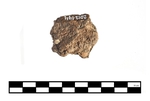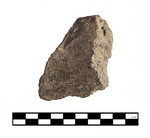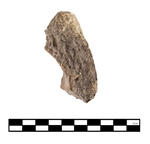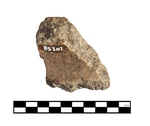Document Content
Introduction
Civitate A is the area to the north of the Medieval road leading to Piano del Tesoro, which makes up the large portion of the north slope of the hill. Previous excavation concentrated on the eastern extent of CA along the Archaic Period Complex, it was the discovery of Archaic metal roasting pits and a number of pieces of copper slag in CA33 during the 1990 season which renewed interest in the western area ( JB I and JB III ).
In 1991 several trenches were excavated in the surrounding area. CA 37 contained what appeared to be an intentional deposit ( TT I ). CA 36, begun during the 1991 season and continued in the 1993 season, revealed another intentional deposit capped by stones ( JB IV and TT IV ). The materials from CA suggest an earlier date for their deposit than that associated with Piano del Tesoro to the east; the finds were generally characteristic of the late 8th century.
An Archaic Period well was discovered in CA ( II, , and ). Excavation of the area surrounding the well in 1998 revealed another intentional deposit with a lozenge shaped
stone capping in CA 42N ( ).
Exploratory trenches CA 56, 57, 58, 59, and 60, dug to the north of CA 36, were excavated in 2007 , , AWB/JEM I , I, and ). Also in 2007 CA 55 was opened adjacent to CA 36 and led to a better understanding of that deposit and its associated stratigraphy ).
In 2009 CA 61 and CA 62 were opened ( and ). CA 62 was integral to understanding CA's stone capping features as there was a rectangular capping of stones 10-15cm in size, about one meter by one and a half meters in dimension, visible at the modern surface level.
Further trenches in the 2010 season (CA 63-69; , , , , , ). did not further clarify the nature of CA deposits.
During the 2012 season, two test trenches, CA 70 and 71, were dropped about 60 meters east of the excavations detailed above( , ). Both trenches came down on seemingly linear rock features, and were extended to explore the features further. Subsequent trenches, CA 72, 73, and 74, were
laid out surrounding CA 70 and 71 and uncovered further linear rock features , , ). All trenches uncovered significant amounts of iron slag and fragmentary, but well preserved, architectural terracottas, vitrified terracottas, two crucible fragments ( 20120102 and 20120194 ), and a bellows fragment ( 20120058 ). During the 2013 season in the northern meters of CA 80 a rock packing was uncovered and it was decided to excavate to the north of this area to uncover the extent of this feature and clarify its chronology.
In 2013 CA 84 will further investigate this area concurrently alongside trenches CA 76, 78, CA 79, CA 77, CA 72 EXT, CA 73 EXT, CA 80, CA 81, CA 82, and CA 83.
The goals of excavation for CA 84 are:
To explore the area immediately to the north of CA 80, in particular the rock-packing in its northern most meter.
To clarify the chronology of the potential architectural features uncovered during the 2012 and thus far in the 2013 season
To potentially reveal new architectural features, stratigraphy, and topographic information
To explore the possibility of further metal working in the area
To better understand and explore this area of Civitate A
| Descriptive Attribute | Value(s) |
|---|---|
| Document Type | Trench Book Entry |
| Trench Book Entry Date | 2013-05-03 |
| Entry Year | 2013 |
| Start Page | 2 |
| End Page | 9 |
| Title | Introduction |
| Descriptive Attribute | Value(s) |
|---|---|
|
Is Part Of
Vocabulary: DCMI Metadata Terms (Dublin Core Terms) |
EMO V
Vocabulary: Murlo |
Suggested Citation
Eóin M. O'Donoghue. (2017) "EMO V (2013-05-03):2-9; Introduction from Europe/Italy/Poggio Civitate/Civitate A/Civitate A84/2013, ID:672". In Murlo. Anthony Tuck (Ed). Released: 2017-10-04. Open Context. <https://opencontext.org/documents/47d514a3-654b-4a9e-8aa1-cf75651badb2> ARK (Archive): https://n2t.net/ark:/28722/k2rj4r792
Copyright License
To the extent to which copyright applies, this content
carries the above license. Follow the link to understand specific permissions
and requirements.
Required Attribution: Citation and reference of URIs (hyperlinks)










